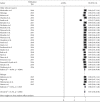Therapeutic Efficacy of Artemether-Lumefantrine (Coartem®) for the Treatment of Uncomplicated Falciparum Malaria in Africa: A Systematic Review
- PMID: 33145101
- PMCID: PMC7599419
- DOI: 10.1155/2020/7371681
Therapeutic Efficacy of Artemether-Lumefantrine (Coartem®) for the Treatment of Uncomplicated Falciparum Malaria in Africa: A Systematic Review
Abstract
Background: Africa still bears the largest burden of malaria as the majority of infections in the continent are caused by P. falciparum. Artemether-lumefantrine (AL, Coartem®) is the most widely used artemisinin-based combination therapy (ACT), for treating uncomplicated falciparum malaria globally. However, the development of resistance to antimalarial drugs is a major challenge for malaria control. In this review, the efficacy of AL for the treatment of uncomplicated falciparum malaria in Africa was evaluated.
Methods: Articles published between January 2015 and July 2019 were systematically searched using comprehensive search strings from PubMed/Medline, SCOPUS, and grey literature from Google Scholar. Interventional studies that followed patients for at least 28 days were included. Two reviewers independently assessed study eligibility, extracted data, and assessed risk of bias. All the included articles were measured to be good quality. While computing the efficacy of AL, polymerase chain reaction (PCR)-corrected cure rate (adequate clinical and parasitological response, ACPR) at day 28 was considered as the main endpoint. Meta-analysis was computed using STATA v 15 to calculate the pooled ACPR.
Results: In this review, 39 articles that reported the treatment outcome of 8,320 patients were included. After 28 days of follow-up, the pooled PCR uncorrected and corrected APCR was at 87% (95% CI: 85-90%) and 97.0% (95% CI: 96-98%), respectively. Moreover, the proportion of early treatment failure (ETF) was almost 0%, while most of the included articles reported <8% late treatment failures. The reinfection and recrudescence rate was less than 10% and 2.6%, respectively, within 28 days. We noted rapid fever and parasite clearance in which greater than 93% and 94% patients were parasite and fever free at day three following AL treatment.
Conclusions: This review discovered that despite more than a decade since its introduction, Coartem® remains effective and thus could continue to be the drug of choice for the treatment of uncomplicated falciparum malaria for all age groups in Africa. However, the risk of new emerging resistance for this combination warrants regular monitoring of its efficacy across the continent.
Copyright © 2020 Awoke Derbie et al.
Conflict of interest statement
Authors declare that they have no competing interests.
Figures



Similar articles
-
Therapeutic efficacy of artemether-lumefantrine in the treatment of uncomplicated Plasmodium falciparum malaria in Chewaka District, Ethiopia.Malar J. 2020 Jul 10;19(1):240. doi: 10.1186/s12936-020-03307-4. Malar J. 2020. PMID: 32650784 Free PMC article.
-
Therapeutic efficacy of artemether-lumefantrine for the treatment of uncomplicated falciparum malaria in northwest Benin.Malar J. 2016 Jan 22;15:37. doi: 10.1186/s12936-016-1091-2. Malar J. 2016. PMID: 26801767 Free PMC article. Clinical Trial.
-
Therapeutic Efficacy of Artemether-Lumefantrine (Coartem®) in Treating Uncomplicated P. falciparum Malaria in Metehara, Eastern Ethiopia: Regulatory Clinical Study.PLoS One. 2016 Apr 29;11(4):e0154618. doi: 10.1371/journal.pone.0154618. eCollection 2016. PLoS One. 2016. PMID: 27128799 Free PMC article.
-
Efficacy of dihydroartemisinin-piperaquine versus artemether-lumefantrine for the treatment of uncomplicated Plasmodium falciparum malaria among children in Africa: a systematic review and meta-analysis of randomized control trials.Malar J. 2021 Aug 12;20(1):340. doi: 10.1186/s12936-021-03873-1. Malar J. 2021. PMID: 34384431 Free PMC article.
-
Efficacy and safety of artemether-lumefantrine for treatment of uncomplicated Plasmodium falciparum malaria in Ethiopia: a systematic review and meta-analysis.Malar J. 2021 May 6;20(1):213. doi: 10.1186/s12936-021-03745-8. Malar J. 2021. PMID: 33957925 Free PMC article.
Cited by
-
Clinical and laboratory characteristics of children with sickle cell disease on hydroxyurea treated with artemether-lumefantrine for acute uncomplicated malaria.Front Med (Lausanne). 2023 Nov 23;10:1291330. doi: 10.3389/fmed.2023.1291330. eCollection 2023. Front Med (Lausanne). 2023. PMID: 38076253 Free PMC article.
-
Adverse reaction to Coartem (artemether/lumefantrine) resulting in oculogyric crisis.Maxillofac Plast Reconstr Surg. 2021 May 17;43(1):13. doi: 10.1186/s40902-021-00300-y. Maxillofac Plast Reconstr Surg. 2021. PMID: 34013443 Free PMC article.
-
Therapeutic efficacy of generic artemether-lumefantrine in the treatment of uncomplicated malaria in Ghana: assessing anti-malarial efficacy amidst pharmacogenetic variations.Malar J. 2024 Apr 29;23(1):125. doi: 10.1186/s12936-024-04930-1. Malar J. 2024. PMID: 38685044 Free PMC article.
-
Increasing day three parasitaemia is observed after treatment of patients with artemether-lumefantrine and single dose of primaquine for uncomplicated Plasmodium falciparum malaria in Arbaminch Zuria district, Southwest Ethiopia.Malar J. 2025 Mar 18;24(1):89. doi: 10.1186/s12936-025-05337-2. Malar J. 2025. PMID: 40102850 Free PMC article.
-
Malaria rapid diagnostic tests in community pharmacies in Rwanda: availability, knowledge of community pharmacists, advantages, and disadvantages of licensing their use.Glob Health Res Policy. 2023 Sep 12;8(1):40. doi: 10.1186/s41256-023-00324-z. Glob Health Res Policy. 2023. PMID: 37700374 Free PMC article.
References
-
- CDC. Drug Resistance in the Malaria-Endemic World. 2019. https://www.cdc.gov/malaria/malaria_worldwide/reduction/drug_resistance.....
-
- WHO. Guidelines for the treatment of malaria. 3rd. 2015. https://apps.who.int/iris/bitstream/handle/10665/162441/9789241549127_en.... - PubMed
-
- WHO. Malaria. 2017. https://www.afro.who.int/health-topics/malaria.
Publication types
LinkOut - more resources
Full Text Sources

